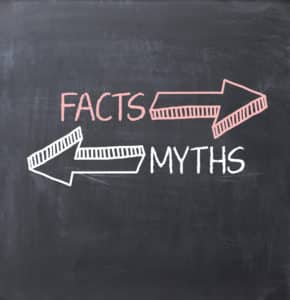 You might find yourself faced with a very attractive yet completely inaccurate myth. It goes a little something like this: “Flossing is unnecessary.” It’s not true but the idea of tossing your dental floss into the trash and relying solely on brushing your teeth every day might sound too attractive to pass up. Do yourself a favor and remember that choosing to believe the myth will lose its allure the moment you receive a diagnosis for a cavity or gingivitis as a result. Give us a moment of your time, so we can accurately dispel the myth and reinvigorate your passion for daily flossing!
You might find yourself faced with a very attractive yet completely inaccurate myth. It goes a little something like this: “Flossing is unnecessary.” It’s not true but the idea of tossing your dental floss into the trash and relying solely on brushing your teeth every day might sound too attractive to pass up. Do yourself a favor and remember that choosing to believe the myth will lose its allure the moment you receive a diagnosis for a cavity or gingivitis as a result. Give us a moment of your time, so we can accurately dispel the myth and reinvigorate your passion for daily flossing!
What Flossing Actually Does
If you don’t understand why we suggest you use dental floss every day, you might have a hard time believing that it’s necessary. This becomes especially true when you begin hearing hints of suggestions from friends that maybe you don’t need to do it at all! Let’s recap:
- When you floss, the thread that you move between your teeth dislodges buildup, which generally includes plaque and food pieces
- If you don’t floss, the plaque and food remain in place, which provides bacteria a resting spot between teeth and often beneath gum tissue
What Happens If You Skip It
You understand at this point that unflossed teeth have buildup between them and beneath gum tissue. Unfortunately, brushing alone will not remove this debris, which means it’s simply going to remain in place. The complications with avoiding dental floss come into play as time unfolds. Unfortunately, even a single day without floss can become treacherous. Here’s why:
- The plaque and food between your teeth are full of bacteria
- The plaque will harden into calculus (or tartar), which encourages the development of infection
- The bacteria feed on food particles
- After feeding, the bacteria release acids into your mouth
- These factors lead to tooth decay and periodontal disease


